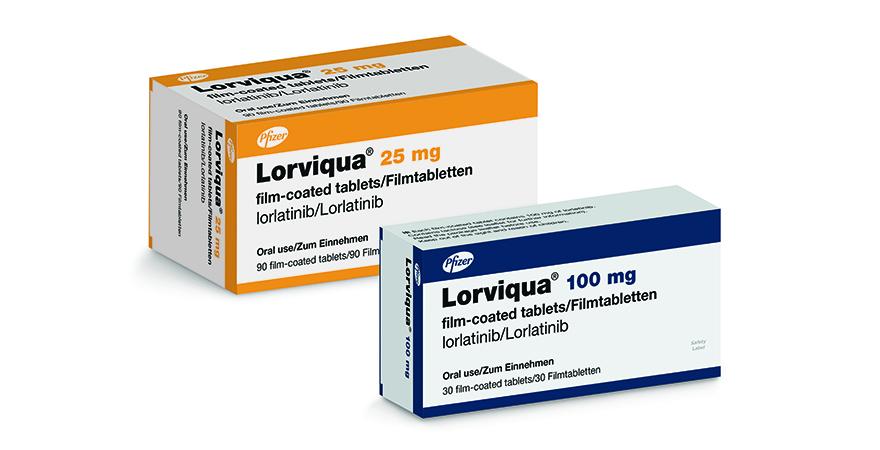Vizimpro (dacomitinib) vs Lorviqua (lorlatinib)
Vizimpro (dacomitinib) vs Lorviqua (lorlatinib)
Vizimpro (dacomitinib) and Lorviqua (lorlatinib) are both oral medications used to treat certain types of non-small cell lung cancer (NSCLC), but they target different genetic mutations and have distinct profiles. Vizimpro is a first-generation tyrosine kinase inhibitor (TKI) designed to inhibit the epidermal growth factor receptor (EGFR) and is typically used for patients with NSCLC harboring EGFR exon 19 deletions or exon 21 L858R mutations. In contrast, Lorviqua is a third-generation TKI that targets ALK and ROS1 rearrangements and is generally prescribed for patients with NSCLC that is ALK-positive or ROS1-positive, particularly after progression on other TKIs. When deciding between these medications, it is crucial to have molecular testing to determine the presence of specific genetic alterations in the tumor, as this will guide the choice of therapy. Additionally, the side effect profiles, dosing schedules, and potential for drug interactions may also influence the decision, and these should be discussed with a healthcare provider.
Difference between Vizimpro and Lorviqua
| Metric | Vizimpro (dacomitinib) | Lorviqua (lorlatinib) |
|---|---|---|
| Generic name | Dacomitinib | Lorlatinib |
| Indications | First-line treatment for patients with metastatic non-small cell lung cancer (NSCLC) with epidermal growth factor receptor (EGFR) exon 19 deletion or exon 21 L858R substitution mutations. | Treatment for patients with anaplastic lymphoma kinase (ALK)-positive metastatic NSCLC. |
| Mechanism of action | Irreversible inhibitor of the EGFR/HER1, HER2, and HER4 tyrosine kinases. | ALK and ROS1 tyrosine kinase inhibitor. |
| Brand names | Vizimpro | Lorviqua |
| Administrative route | Oral | Oral |
| Side effects | Diarrhea, rash, paronychia, stomatitis, decreased appetite, dry skin, decreased weight, alopecia, cough, pruritus. | Edema, peripheral neuropathy, cognitive effects, dyspnea, weight gain, hypertension, fatigue, mood effects. |
| Contraindications | Patients with a history of severe hypersensitivity to dacomitinib or any other component of Vizimpro. | Patients with a history of severe hypersensitivity to lorlatinib or any other component of Lorviqua. |
| Drug class | Tyrosine kinase inhibitor | Tyrosine kinase inhibitor |
| Manufacturer | Pfizer | Pfizer |
Efficacy
Vizimpro (dacomitinib) for Lung Cancer
Vizimpro (dacomitinib) is an oral medication that functions as a tyrosine kinase inhibitor, specifically targeting the epidermal growth factor receptor (EGFR). It is approved for the first-line treatment of patients with metastatic non-small cell lung cancer (NSCLC) with EGFR exon 19 deletion or exon 21 L858R substitution mutations as detected by an FDA-approved test. Clinical trials have demonstrated the efficacy of Vizimpro in improving progression-free survival compared to other EGFR inhibitors. In a pivotal phase III trial, Vizimpro significantly extended the median progression-free survival when compared to gefitinib, another EGFR inhibitor, in patients with previously untreated NSCLC with EGFR mutations.
Lorviqua (lorlatinib) for Lung Cancer
Lorviqua (lorlatinib) is another targeted therapy approved for the treatment of patients with anaplastic lymphoma kinase (ALK)-positive metastatic NSCLC. As a third-generation ALK inhibitor, Lorviqua has shown efficacy in patients who have progressed on prior ALK inhibitors. Clinical trials have highlighted Lorviqua's ability to induce a response in a significant proportion of patients, including those with central nervous system (CNS) metastases. The drug has been shown to be effective in patients who have become resistant to earlier-generation ALK inhibitors, providing a valuable treatment option for this subset of lung cancer patients.
Comparative Efficacy in Lung Cancer Treatment
While both Vizimpro and Lorviqua are effective in treating certain types of lung cancer, their efficacy is dependent on the presence of specific genetic mutations. Vizimpro is specifically effective in patients with EGFR mutations, and Lorviqua is tailored for those with ALK rearrangements. It is important to note that these medications are not interchangeable and are used to target different genetic drivers of lung cancer. The selection of either Vizimpro or Lorviqua as a treatment option is based on the molecular profile of the lung cancer, which is determined through comprehensive genomic testing.
Conclusion
In conclusion, both Vizimpro and Lorviqua have demonstrated significant efficacy in the treatment of lung cancer, albeit in different patient populations defined by distinct genetic alterations. The use of these targeted therapies represents a shift towards personalized medicine in lung cancer treatment, where the choice of therapy is guided by the molecular characteristics of the tumor. Continued research and clinical trials are essential to further understand the full potential and optimal use of these medications in the management of lung cancer.
Regulatory Agency Approvals
Vizimpro
-
European Medical Agency (EMA), European Union

-
Food and Drug Administration (FDA), USA

Lorviqua
-
European Medical Agency (EMA), European Union

-
Food and Drug Administration (FDA), USA

-
Health Canada

-
Therapeutic Goods Administration (TGA), Australia

Access Vizimpro or Lorviqua today
If Vizimpro or Lorviqua are not approved or available in your country (e.g. due to supply issues), you can access them via Everyone.org.
How it works

Make an enquiry
Choose the medicine you want to buy, answer a couple of questions, and upload your prescription to speed things up. We’ll get back to you within 24 hours.


Make an enquiry
Choose the medicine you want to buy, answer a couple of questions, and upload your prescription to speed things up. We’ll get back to you within 24 hours.


Breeze through the paperwork
We'll guide you through the required documents for importing unapproved medicine, ensuring you have all the necessary information.


Get a personalized quote
We’ll prepare a quote for you, including medicine costs and any shipping, administrative, or import fees that may apply.


Receive your medicine
Accept the quote and we’ll handle the rest - sourcing and safely delivering your medicine.

Some text on this page has been automatically generated. Speak to your physician before you start a new treatment or medication.
Let's talk
If you have any questions, call us or send us a message through WhatsApp or email:
Contact us




